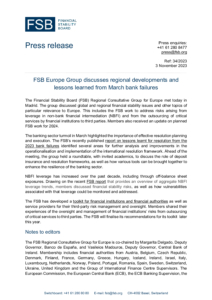Press enquiries:
+41 61 280 8477
[email protected]
Ref: 7/2024
The Financial Stability Board (FSB) Regional Consultative Group (RCG) for Europe met today in Dublin.
The group discussed global and regional macroeconomic developments and their implications for financial stability. The macro-financial environment continues to be shaped by the adjustment of the global economy to high interest rates, while geopolitical factors are weighing on the outlook. Despite tight financing conditions and subdued confidence, growth in the region is projected to gradually pick up, amid a recovery in real incomes. In global financial markets, certain asset valuations remain stretched and vulnerable to adjustment in the face of adverse shocks. Members discussed sectors which warranted close monitoring, specifically the outlook for – and risks associated with – commercial real estate markets, which have been undergoing a substantial adjustment recently, due to both cyclical and structural shocks.
Members received an update on the FSB’s work priorities for 2024, including its deliverables under Brazil’s G20 Presidency. The effective implementation of its global regulatory and supervisory framework for crypto-asset activities and markets is a key focus for the FSB. Members shared their experiences in addressing regulatory challenges stemming from the cross-border and cross-sectoral nature of crypto-asset activities. They also exchanged views on preparations for new crypto-asset regulations entering into force, such as the Regulation on Markets in Crypto-assets (MiCA) in the European Union and the proposed regulatory regime for crypto-assets in the United Kingdom.
The Brazilian G20 Presidency has asked the FSB to take stock of new developments in artificial intelligence (AI) and their potential implications for financial stability. The day before the meeting, the RCG held a seminar with invited guests from academia and industry on AI and its role in the financial system. The discussion focused on developments in AI, use cases in the financial sector, and implications for financial stability.
Notes to editors
The FSB Regional Consultative Group for Europe is co-chaired by Margarita Delgado, Deputy Governor, Banco de España, and Vasileios Madouros, Deputy Governor, Central Bank of Ireland. Membership includes financial authorities from Austria, Belgium, Czech Republic, Denmark, Finland, France, Germany, Greece, Hungary, Iceland, Ireland, Israel, Italy, Luxembourg, Netherlands, Norway, Poland, Portugal, Romania, Spain, Sweden, Switzerland, Ukraine, United Kingdom and the Group of International Finance Centre Supervisors. The European Banking Authority (EBA), the European Commission, the European Central Bank (ECB), the ECB Banking Supervision, the European Securities and Markets Authority (ESMA), and the European Systemic Risk Board (ESRB) also attended the meeting.
The FSB has six Regional Consultative Groups, established under the FSB Charter, to bring together financial authorities from FSB member and non-member countries to exchange views on vulnerabilities affecting financial systems and on initiatives to promote financial stability.1 Typically, each Regional Consultative Group meets twice each year.
The FSB coordinates at the international level the work of national financial authorities and international standard-setting bodies and develops and promotes the implementation of effective regulatory, supervisory, and other financial sector policies in the interest of financial stability. It brings together national authorities responsible for financial stability in 24 countries and jurisdictions, international financial institutions, sector-specific international groupings of regulators and supervisors, and committees of central bank experts. The FSB also conducts outreach with approximately 70 other jurisdictions through its six Regional Consultative Groups.
The FSB is chaired by Klaas Knot, President of De Nederlandsche Bank. The FSB Secretariat is located in Basel, Switzerland and hosted by the Bank for International Settlements.
- The FSB Regional Consultative Groups cover the following regions: Americas, Asia, Commonwealth of Independent States, Europe, Middle East and North Africa, and sub-Saharan Africa. [←]
